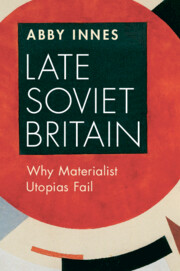Book contents
- Late Soviet Britain
- Late Soviet Britain
- Copyright page
- Epigraph
- Contents
- Figures
- Acknowledgements
- Introduction
- Part I The Materialist Utopias
- 1 Rationality and Closed-System Reasoning
- 2 General Equilibrium and the Balanced Plan
- 3 On Bureaucracy
- 4 On ‘Organised Forgetting’ in the Governing Science
- Part II Britain’s Neoliberal Revolution
- Part III The Rise and Fall of the Neoliberal ‘Movement Regime’
- Index
1 - Rationality and Closed-System Reasoning
from Part I - The Materialist Utopias
Published online by Cambridge University Press: 14 September 2023
- Late Soviet Britain
- Late Soviet Britain
- Copyright page
- Epigraph
- Contents
- Figures
- Acknowledgements
- Introduction
- Part I The Materialist Utopias
- 1 Rationality and Closed-System Reasoning
- 2 General Equilibrium and the Balanced Plan
- 3 On Bureaucracy
- 4 On ‘Organised Forgetting’ in the Governing Science
- Part II Britain’s Neoliberal Revolution
- Part III The Rise and Fall of the Neoliberal ‘Movement Regime’
- Index
Summary
In this chapter Innes explores how Soviet economics, and the neoclassical economics behind British neoliberalism, came to conceive of the political economy as a closed system, governed by predetermined economic laws and dependable behaviours. Both orthodoxies are shown to depend on arguments about the universal truths of the political economy that are not just utopian, but tautological - circular - in their reasoning. Their axiomatic assumptions and actions are valid, as distinct from true, by virtue only of their logical formulation, and their end goals are consequently as impossible to realise as they are to refute. By exploring the evolution of both Soviet and neoclassical economic thought, Innes outlines the affinities between the ‘social physics’ of neoclassical economics and the deterministic assumptions of Stalinist central planning, and explains why it is that even the relatively critical, ‘second best world’ neoclassical economics that became associated with New Labour policy is freighted with no less determinism than the ‘first best world’ assumptions adopted by the New, neoliberal right.
Keywords
- Type
- Chapter
- Information
- Late Soviet BritainWhy Materialist Utopias Fail, pp. 23 - 50Publisher: Cambridge University PressPrint publication year: 2023

